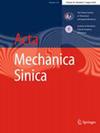Bifurcation analysis of a railway wheelset system with random excitation and displacement delay feedback
Abstract
This paper investigates the dynamics of a railway wheelset system subjected to random excitation and governed by a displacement delay feedback controller. Initially, the delay component of the wheelset system was estimated utilizing standard form theory and center manifold theory. Subsequently, the differential equation characterizing the stochastic wheelset system was reformulated into a form that incorporates both amplitude and phase, employing the random averaging technique. The local stability of the wheelset system was subsequently assessed using the Lyapunov exponent method, while global stability was evaluated through singular boundary theory. Additionally, the random bifurcation characteristics of the wheelset system were examined using probability density function diagrams. Ultimately, numerical simulations were performed to analyze the influence of velocity and delay on the stochastic dynamics of the wheelset system, and the theoretical results were validated.

 求助内容:
求助内容: 应助结果提醒方式:
应助结果提醒方式:


